Buying
| Newer Posts | Older Posts |
What if I don’t have enough for a 20% down payment? |
|
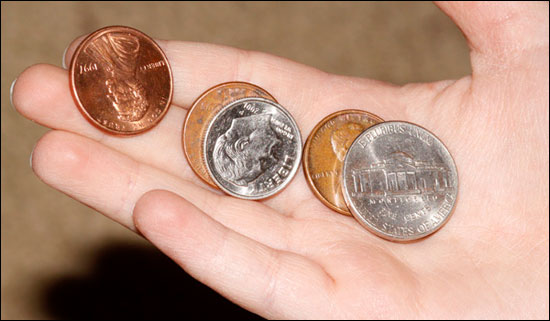 Good news -- it won't be a problem if you don't have a 20% down payment. Some people think that you need a 20% down payment these days, since financing guidelines have become so much more restrictive over the past year or two. That's simply not the case. The FHA loan program is an excellent example of a low down payment loan option that many buyers are using these days. You can purchase a home with as little as 3.5% of the purchase price as a down payment. Furthermore, your closing costs and/or your down payment can be a gift. The VA loan program (available to qualified veterans, reservists, and active-duty service members) requires no down payment and your closing costs can be a gift. For more information about FHA loans or VA loans, read more on the Government Loans section of Wells Fargo's web site. Again -- remember -- you don't need a 20% down payment to buy a house these days. If you'd like to talk more about your buying situation, feel free to contact me at 540-578-0102 or scott@HarrisonburgHousingToday.com. | |
Is Homeownership Important? |
|
Buy A Home! It is the American Dream! But why, you might ask? Well, here's a bit of the historical political context for the American Dream, per the National Association of Realtors:
But despite the fact that America has prioritized homeownership for decades, and most Americans strive to own a home, it seems that structural changes might be on their way that seem likely to decrease the ability of Americans to fulfill the American Dream. As reported by WHSV earlier this week, "The Obama administration released a report to Congress last week outlining what it wants to do to reform the housing finance market. Some of the proposals include larger down payments, increased fees and possibly ending 30-year mortgages." As summaryized in the Wall Street Journal, "The Obama administration outlined on Friday its plans to begin shrinking the government's broad support of the nation's crippled mortgage market, a process that officials said could take several years and would include phasing out Fannie Mae and Freddie Mac." What would the results be? Again, confirming my hypothesis: "The cost of mortgages is probably going to go up, and homeownership is probably going to go down," said Daniel Mudd, the former chief executive of Fannie Mae who is now CEO of Fortress Investment Group. "Both of those things arguably could be a good thing." This entire train of thought leaves me with more questions than answers, but it seems that we may continue to see some significant transitions in the housing market in the next year years. Stay tuned! | |
Peer Pressure in Real Estate: If everyone else rejected this house, I probably should too, right? |
|
 Yet another reason to get the list price right from the beginning --- if you start your list price too high, and languish on the market, new prospective buyers looking a a new price will still wonder why nobody has bought it to date, and will be less likely to act based on the lengthy time on the market. I can't tell you how many times (a lot) lately I have been showing a house to a buyer client and after finding out how long the house has been on the market (6 months, 8 months, 14 months, etc) they say: "so.....why hasn't this sold, given all of that time on the market?" Sometimes we can figure out why --- because the price started to high, or because they hadn't yet staged the empty house with furniture, etc., etc. That said, quite often we can't figure out any particular reason why a house hasn't sold after having been on the market for many (or many-many) months. This often leaves my buyer clients in a state of uncertainty, full of doubt and some fear. Even if they like the house (and even if they are considering pursuing it) they wonder why their home buying peers have not bought the house to date. If other reasonably intelligent home buyers have looked at the house and decided NOT to buy it, there must be a reason --- and even if my buyer client can't see that reason, they should probably follow the lead of those who had viewed the house previously --- by not buying the house --- right? Hard to say. Right now a home buyer in this state of mind can console themselves by thinking about how sellers far outnumber buyers -- thus there will always be lots of houses that haven't sold even though you REALLY think they should have. But even so, there will continue to be doubt and concern filling the room as prospective buyers realize that all of the past prospective buyers concluded that they should NOT buy the house. Again -- one good lesson to take from this as a seller is to realize that it is of utmost importance to have your home priced appropriately from the start, and to make sure your home is being marketed to the fullest extent possible --- from Day 1. | |
We won't know it's a dead end until we get there. |
|
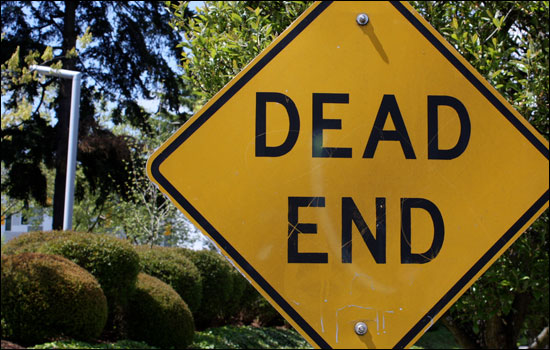 In the past two weeks, two of my clients have apologized for taking up my time in pursuing properties that each ended up being a dead end. While I appreciated the sentiment, and I value my time, I was quick to point out that researching those possible paths was the only way to discover that they were indeed dead ends. Whether a large purchase, or a small purchase, when you are buying a home (or a building lot) it is a big decision -- financially and otherwise. Oftentimes, figuring out which house (or building lot) you want to buy requires lots of research and exploration of properties that you do not end up pursuing. It's OK! I'm happy to patiently help you explore the different options -- that's what I'm here for. Furthermore, I would much rather we spend a little bit "too much" time researching in order to make sure you are making the best possible decision than spend too little time and leave you with second thoughts after the fact. So, if you are preparing to buy a home, get ready for plenty of delightful exploration of possible properties that will only end up to be dead ends. Again it's OK --- that's the only way we'll find the perfect property for you. | |
Sales Growth and Decline Vary Significantly By Area |
|
Over the past year our local real estate market has been relatively stable (only a 1% decline in single family home sales) but it turns out that the changes in market activity have varied quite significantly by location. 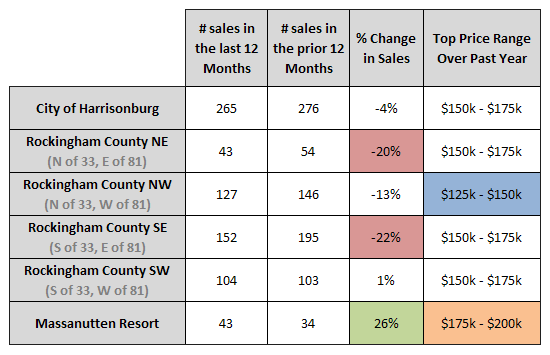 As you can see above, despite overall stability several areas saw continued decline in sales:
| |
Where have all the listings gone? Long time passing... |
|
As referenced a few days ago, the inventory of listed homes in Harrisonburg and Rockingham County has dropped significantly (by 23%) over the past six months. But as Pete Seeger might ask... where have all the listings gone? 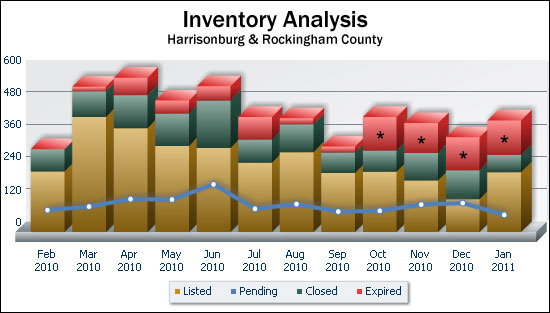 It turns out the listings expired. Take a look at the huge chunk of listings that expired during each of the past four months (Oct, Nov, Dec, Jan) -- each is a red bar with a star in it. As long as those late-2010 expired listings don't turn into early-2011 new listings, the market might stand a chance of heading towards more stability. Stay tuned! For the analytical minds amongst us, a few notes about the data:
| |
It’s Amazing How "Dumb" Smart People Can Be |
|
First --- let's be clear --- I'm not accusing smart people of sometimes being dumb. The title of this post is actually a quote from a smart person last week. She said something along the lines of "Wow, it's amazing how dumb smart people can be sometimes". I quickly translated "dumb" into "uninformed about specific topic areas" --- which she thought was a gesture of politeness, but I really think it is a fair judgment of what she was describing. Again, she's quite a bright person, but....
Bottom line -- if you only participate in something every 5 to 8 years, it's probably not reasonable to think you'll know and retain the intricacies (or even the basics) of that content area during the 5 to 8 (or more) years in between such events. If you bought a house today, you'd likely have learned during the process of doing so that you could have as little as 3.5% of the purchase price to use as a downpayment. Will you retain that information for the next 5, 8, 12 years until you buy your next home? You might, but you might also hear lots of news reports over the next three years about changing (tightening) lending requirements and then start to assume that these low downpayment programs no longer exist. If you bought a house 12 years ago and were told that you had a credit score of 800, and that it was excellent, would you remember that today (12 years later)? Or might you forget that the range is between 300 and 850? Now realizing that smart people can be dumb (uninformed) about specific topic areas, what can we conclude? Consumers should remember to not make any assumptions, and to ask questions even if they seem like they are dumb questions. Professionals (Realtors, lenders, etc.) should remember that consumers might not necessarily know the basics of what is required for a mortgage, or what good credit looks like. Have questions yourself? Don't worry, I won't think you're dumb -- I'll happily help inform you about an area of information that you probably had no need to be aware of until recently. Call anytime (540-578-0102), or send me an e-mail: scott@HarrisonburgHousingToday.com. | |
New home sales may be improving in and around Harrisonburg |
|
 New home sales may be improving in and around Harrisonburg -- based totally on anecdotal evidence. Several of the builders I work with have seen significantly increased activity since the first of the year, and this is after several years of declining new home sales, as shown below. 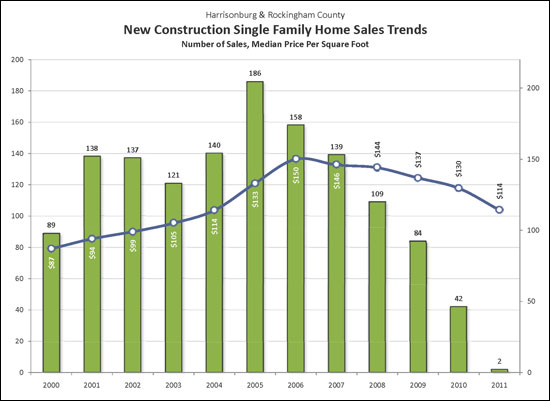 It somewhat stands to reason -- as I pointed out yesterday, housing supply has been dwindling over the past six months. There was a 23% drop in listing inventory between July 2010 and January 2011, as compared to only a 5% drop during the same time period a year earlier. Fewer homes for sale leads to fewer selections for home buyers, leads some buyers to start exploring new construction homes once again. The trend over the past few years away from new homes was a matter of re-sale homes being more affordable than new homes. It was nearly impossible to build a new home at the same price that some re-sale homes were selling for in the market. Now, however, builders who have compelling products to offer, with competitive pricing, stand a chance to see a solid improvement in sales during 2011. | |
So, would it be a good time to buy a house right now? |
|
A colleague asked me this question at a meeting of the Shenandoah Valley Builders Association this evening: So, would it be a good time to buy a house right now? I responded that it would be, IF.....
But if you do meet my rough qualifiers above, now can be a fantastic time to buy, as you'll get to take advantage of:
P. S. There are plenty of other aspects of your particular scenario that could weigh your decision more or less towards buying. I'm happy to work with you to talk through that decision making process. Let me know if that would be helpful to you. You can reach me at 540-578-0102 or scott@HarrisonburgHousingToday.com. | |
Mixed Signals From January Housing Market Activity in Harrisonburg and Rockingham County |
|
My most recent market report (excerpts below, full report here) shows a variety of mixed market indicators when examining market data through January 31, 2011:
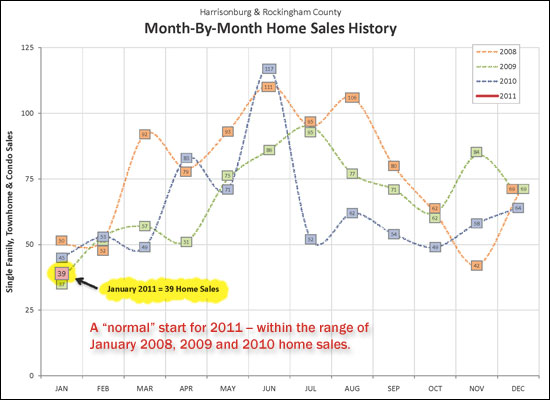 Home sales in January 2011 (39 sales) were down compared to the 45 sales in January 2010 -- but up compared to the 37 sales in January 2009. This is a relatively even start for 2011, and if the past three years are any indicator, we'll have around 50 home sales in February. 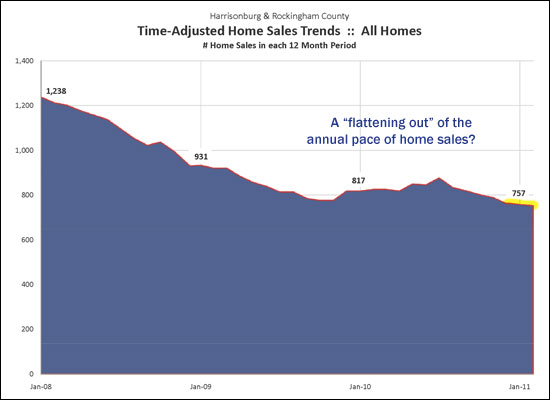 This graph shows a rolling 12 months of home sales -- and you can see that the annual pace of home sales has been declining for several years other than the temporary respite offered by the home buyer tax credit last year. The last several months, however, seem to be offering some leveling out of this indicator. 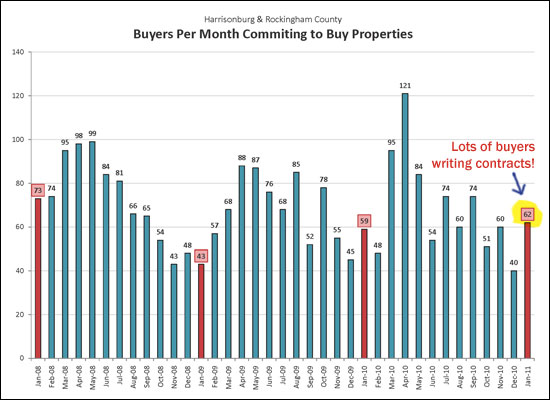 Buyers were out in full force in January 2011 -- 62 properties went under contract. This is an increase over January 2010 (59 contracts), an increase over January 2009 (43 contracts) and an increase over last month (40 contracts). This could be a strong spring market. 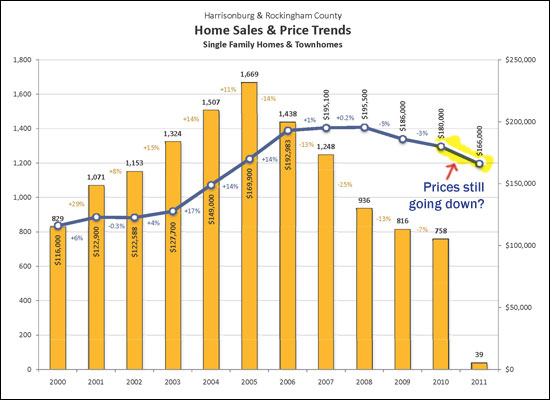 Perhaps due to a small sample size, the median sales price continues to decline in January 2011. 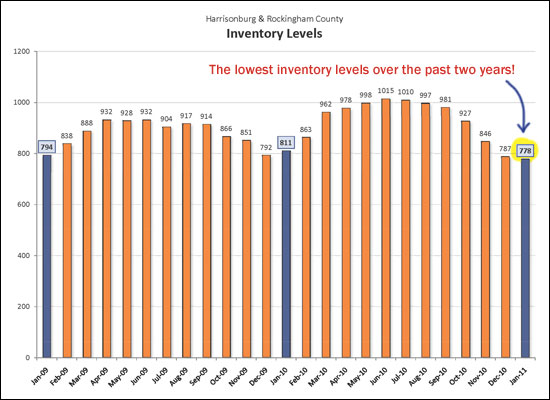 We are currently seeing the lowest inventory levels that we have seen over the past two years. This can help the market to stabilize, unless the market is flooded with listings in March and April. 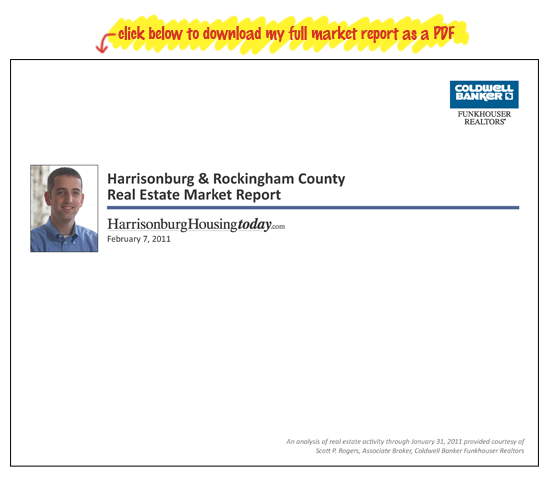 Click the image above (or here) to read the full report. If you have questions about this report, or if I can be of assistance with real estate that you own, or that you'd like to own, please be in touch. You can reach me most easily at 540-578-0102 or scott@HarrisonburgHousingToday.com. | |
There must be some good deals out there -- we've seen a LOT of price reductions lately! |
|
 When I log into our MLS (multiple listing service) I see a variety of early indicators about the present state of the market. I'm confronted with information about the number of new listings, the number of sold listings, the number of price changes, etc. These numbers usually don't vary too much during the course of a month --- other than on weekends, when the numbers dip, and on Mondays when they generally rise. The "price change" statistic, however, has been quite astounding of late. For example --- in the past 30 days there have been 235 price changes on properties in our local MLS (Harrisonburg-Rockingham Association of Realtors). All of these properties aren't in Harrisonburg and Rockingham County, but I think it becomes pretty evident that there are a lot of motivated sellers out there, showing that they are ready to sell by lowering their list prices. Perhaps an equally disturbing statistic that also faces me when I log in is the number of new listings versus the number of sales. In the past 30 days there have been 68 sales, and a whopping 226 new listings. This includes all areas and all property types, but regardless, that's an imbalance I don't like to see. Oh, and yes, the graphic above is illustrating an actual sales pitch I received by e-mail this past week. A currently listed property will have a $2,000 price reduction each week --- presumably until it sells! | |
To hire a custom builder, or to buy a re-sale home --- it's a tough question these days! |
|
The abundance and low prices of re-sale homes can cause great frustration for custom home builders these days. Over the past few months I have had lengthy conversations with several clients who want to build a new home.....but then they get sidetracked by re-sale homes. They start out, you see, quite focused on buying a lot, selecting and designing floor plans, hiring a builder, and building their dream home ---- but WAIT! Just before they tip the first domino, they take a look online at a few re-sale homes and they start to second guess themselves. They're about to build a $400,000 home, and they think they see comparable re-sale homes (that are only a few years old) for only $350,000. Or they're about to build a $475,000 house, and there seem to be quite a few comparable $430,000 homes that are only a few years old. My universal answer to this angst is to suggest that we spend some time viewing the re-sale homes. I suggest to them that looking at the re-sale homes will DEFINITELY give them their answer. They'll either confirm their decision to hire a custom builder --- or they'll fall in love with a re-sale home and move forward in that direction. You'd think, with the price gaps we're discussing, that these clients would often end up buying a re-sale home --- but that's not usually what happens. While there are some compelling re-sale houses for sale, they almost always determine that they'd rather pay more to have a house exactly how they want it. Sometimes this is the floor plan, sometimes the neighborhood, or the lot size or topography, or the exterior materials of the home, or the interior finishes, or the level of maintenance needed into the future, or the views.......or a combination of many of these. Sometimes this process will result in one of my clients deciding to buy a re-sale (instead of hiring a custom builder), but it almost always is a process that helps to confirm their decision to move forward with a custom build. If you're in this situation --- ready to build, but full of self-doubt when examining the re-sale market --- please be in touch. I'd be happy to help you explore the re-sale market to either confirm or derail your current plans. | |
What are your predictions for the local real estate market in 2011? |
|
What do you think? Will the real estate market be getting better in Harrisonburg and Rockingham County during 2011? Could it get any worse? One of my predictions can be found here. One (of many) indicators that I monitor is how many people are using our company web site and agent web sites. 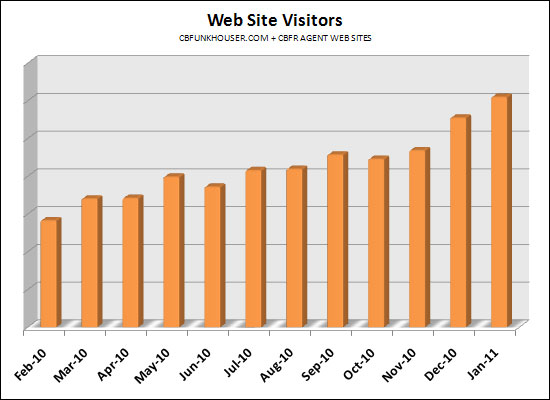 The meaning of this data is not immediately clear to me --- because there is a near constant increase in web site usage over the past twelve months. I expected to see much more seasonal variation in this metric. Web traffic did dip down slightly in October 2010, which would make sense if more people were looking for properties during the summer months. The big shock, however, is that buyers seem to be out (online at these web sites) in large numbers right now. Even if these interested buyers aren't all turning into active buyers, it is exciting to see that there has been so much activity in December and January. So.....what are your predictions for the local housing market in 2011? | |
Owners of Rental Property in Harrisonburg: Get ready for more IRS paperwork! |
|
 Thanks to one of my clients, who pointed this new regulation out to me.... If you own rental property, you must now submit a 1099 form to the IRS and to service providers if you pay $600 or more for the provided service -- such as to a plumber, carpenter, painter, landscaper, etc. Apparently, the basis for this requirement is to make sure that contractors are not hiding their income. Requiring that this information from rental property owners will (potentially) reveal more income that should be taxed. This goes into effect for 2011 rental property income and expenses, so start keeping detailed records, if you're not already. Do you love legislation and taxation? Read more about the Small Business Jobs Act of 2010, which enacts this new requirement. | |
Buying a Foreclosure |
|
 If you are in the market to buy a home, some of the properties you might be considering are foreclosures – but there are some distinctions to be aware of at different stages of the foreclosure process. It is possible to buy a home from the owner before they are foreclosed on even if they cannot pay off their mortgage – this is called a short sale. Or, you might buy a property at the courthouse steps when it is being auctioned – this is called a trustee sale. Finally, if a property does not sell at the auction, you can buy the property from the lender after they have taken ownership of the property – this is called a bank owned property or REO property. Short Sales: Some homeowners must sell their home, but market conditions won't allow them to sell it at a high enough price to be able to pay off their mortgage(s). In this example, a homeowner might have a $250,000 mortgage balance but can only sell the property for $230,000. As a prospective buyer, it is sometimes possible to purchase this type of a property through a process called a "short sale." In such an arrangement, the homeowner petitions their lender to accept less than the full payoff of the mortgage and in return to still release the deed of trust so that ownership of the property can be transferred over to you, the new owner. This can benefit the lender, as they skip the time delays and cost of the foreclosure process. This can also benefit the homeowner, as a short sale will have a slightly lesser negative impact on their credit as compared to a foreclosure. As a buyer, however, you must know that there are challenges to buying a property as a short sale. The biggest challenges of late seem to be the uncertainty of the purchase and the time table. Even if you and the homeowner agree to a price of $230,000, the homeowner's lender must still agree to accept that price – since it won't allow the homeowner to pay off their $250,000 mortgage balance in full. This process of waiting to hear back from a lender, and then complying with all of their various terms can sometimes take 60 to 120 days – or longer! Trustee Sales: If a short sale does not take place, and a homeowner is behind on their payments (or not making them at all), eventually the property will be sold by the lender on the courthouse steps. Buying a property at a "trustee sale" can be exciting, and can be a great opportunity – but there are challenges as well. If a property to be sold at a trustee sale is also listed for sale with a Realtor, you can usually view the property ahead of time by calling your Realtor. Otherwise, you will likely not have the opportunity to see inside the property before the trustee sale, and thus you will not know too many details about the condition of the property. Furthermore, your purchase of the property at the trustee sale cannot be contingent upon viewing the property, or inspecting the property. In this instance, you are purchasing the property in "as is" condition, regardless of what you then find out about the property. It is also important to note that many times the lender will have an opening bid at the trustee sale that is close to (or sometimes higher than) the amount that they are still owed on the mortgage. Thus, in the example above, they might make an opening bid of $250,000. As a result of this opening bid process, many (or most) properties available for purchase at a trustee sale are not great opportunities. Occasionally, a property will be foreclosed upon that has had a mortgage in place for many years, whereby the balance of the mortgage is much lower than current market value – these are great opportunities for a buyer. Bank Owned Properties: If you don't buy the property before the auction (as a short sale), and don't buy it at the trustee sale, you'll have a third opportunity to buy it once the bank owns it. These properties are called "bank owned properties" or REO properties ("real estate owned"). Oftentimes, the prices on these properties are quite realistic, if not under market value. It would not be atypical for a house such as the one mentioned above to come on the market after the trustee sale at a price of $210,000. In such an instance, you should expect to be buying the property in "as is" condition, and you will also be buying with a slightly different contract document. Most lenders have a long standard contract or contract addendum that spell out a variety of additional contract terms designed to protect them from any future liability – and rarely will a lender agree to have these contract documents changed in any way. As you can see above, oftentimes buying the property as an REO property is where the best opportunity lies. When a home goes into foreclosure it is often for very sad and unfortunate reasons – such as the loss of a job – and I do not wish such circumstances on any homeowner. However, if you are a buyer in today's market it is important to be familiar with different methods for buying a property when it will be, is being, or has been foreclosed upon. For information about upcoming trustee sales, please refer to HarrisonburgForeclosures.com. For information about purchasing a property as a short sale, or purchasing a bank owned property, please e-mail me at scott@HarrisonburgHousingToday.com or call me at 540-578-0102. | |
Home buyers are probably getting GREAT deals these days, right? |
|
In a lot of ways, they are --- but it's not as extreme as you might think. After observing several houses go under contract at fantastic prices I was pondering aloud that it seemed that finding the right price would make buyers appear . . . because you'd be offering them a great deal. That prompted someone to ask me about current price per square foot prices for houses --- and whether buyers were getting great deals these days. Thinking about one of the houses that had recently gone under contract, I commented that yes, houses are DEFINITELY selling at GREAT price per square foot rates. That will teach me to make a broad statement based on one or two data points. This evening I dove into the data to take a closer look --- and to confirm what I was quite sure to be true. To get the best possible sense of the deals buyers are getting these days on a price per square foot basis, I decided to narrow down the sold properties I was examining. If I examined all properties of a variety of sizes and ages, there would be so many variables at play that it would be hard to draw any conclusions. Here's how I limited my two sample sets of data:
My second data set examined homes matching the same criteria that sold during 2010 -- there were 35 such homes, and they sold at an average of $111/sf. Hmmmmm......$4/sf better than a year ago.....is that a great deal for a buyer? That provides a $8,000 savings on a 2,000 square foot house. Instead of buying the house for $230k (in 2009) you'd have paid $222k (in 2010). That doesn't seem like an extraordinary cost savings to buyers --- so perhaps in the aggregate buyers aren't getting amazing deals now (compared to a year ago), even though they are getting slightly better deals. Examined one other way, 26% of these houses sold for less than $100/sf in 2009......and in 2010, 29% sold for less than $100/sf. So, it seems that while there are some isolated AMAZING DEALS in the current real estate market, you probably won't be able to get a FANTASTIC DEAL on EVERY house that's out there. But, of course, every seller trying to sell their house right now would like me to remind you that:
| |
Has the real estate market (finally) hit bottom in Harrisonburg and Rockingham County? |
|
I say yes --- but do bear in mind, I've thought this a few times before. I recently realized that the overall trend I examine in my market report each month (total number of residential sales) might not be the best indicator of what is taking place in our residential real estate market. That overall trend, you see, not only includes single family (detached) homes, but also includes townhomes and condos. At least some number of townhomes and condos are investment properties, and thus that segment of the market can look better or worse than the more traditional "I'm buying a house to live in it" segment of the residential market. For that reason, I believe that we will likely get a better sense of the health of the residential (I'm buying a house to live in it) market by examining only single family home sales. And with that preface aside, here's what we find..... 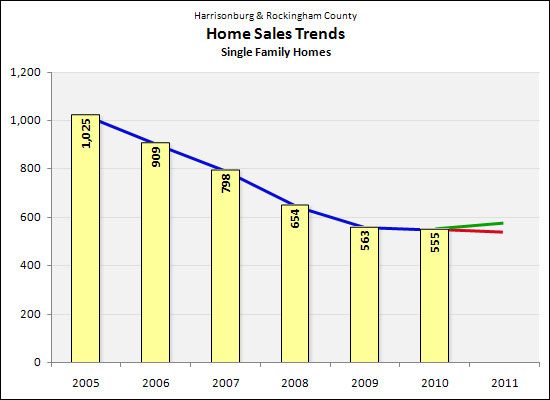 As you can see, there were steady declines in the single family home market from 2005 through 2009 (-11%, -12%, -18%, -14%). That steady decline, however, slowed down significantly between 2009 and 2010 (-1%). That is a wonderful sign that the residential real estate market may truly be stabilizing. So, what are my predictions for 2011? I don't think we will see any more than a 2% decline in single family (detached) home sales --- as shown (approximately) with the red line. I also, however, don't think we will see any more than a 2% increase in single family (detached) home sales --- as shown (approximately) with the green line. After five years of a declining residential real estate market in Harrisonburg and Rockingham County, I think we might finally be poised to see an increase in sales activity. | |
Will Foreclosures Dominate 2011 Home Sales in Harrisonburg and Rockingham County? |
|
The Associate Press (AP) story below ran a few weeks ago in the Daily News Record. AP stories often don't reflect market realities here in Harrisonburg and Rockingham County, so I must admit I didn't really believe it to be true in our local area. 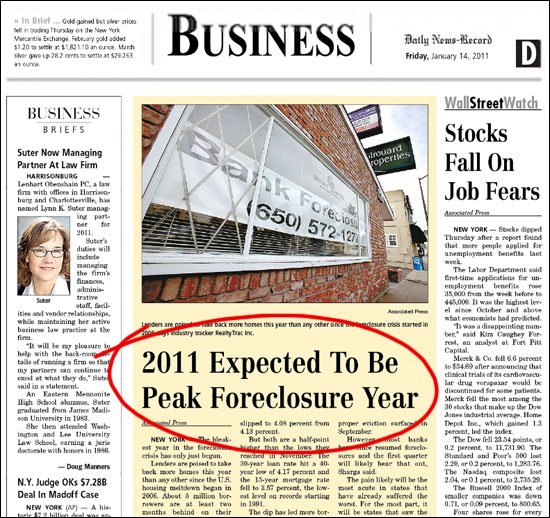 This headline came to mind again, however, when I was analyzing the 47 properties to go under contract in Harrisonburg and Rockingham County thus far in 2011. Each statistic below speaks to the types of properties that are actually selling these days, and the types of buyers that are actually buying. Of the 47 properties that have gone under contract thus far in 2011....    | |
Lot Sales in Harrisonburg and Rockingham County |
|
Let's take a bit of a closer look at lot sale in Harrisonburg and Rockingham County --- first, with a more visual look at the 2010 sales figures I reported a few days ago. 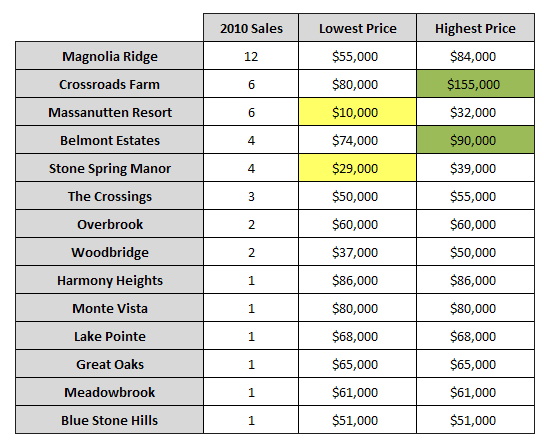 A few notes:
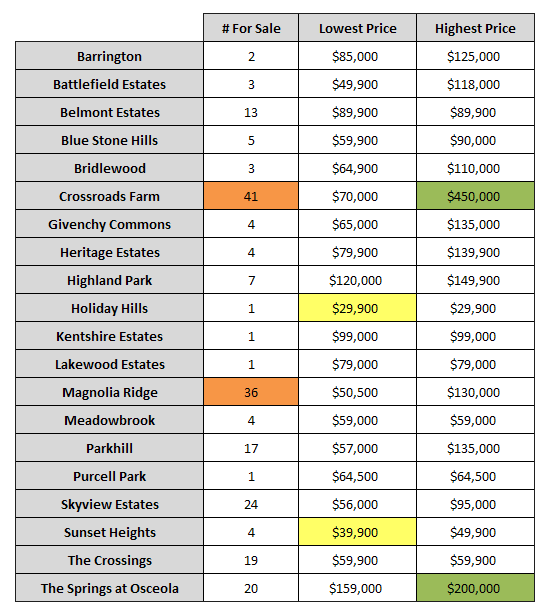 A few notes:
| |
If the price is right, the buyers will appear! |
|
In a somewhat turbulent real estate market, it is often difficult for a seller to determine an appropriate list price. Many sellers are certainly trying to find it.... 148 of the 802 active residential listings in Harrisonburg and Rockingham County have seen a price change in the past 60 days. So, what does it take? Is there a magical number, below which a house will instantly sell? Sometimes there is! A house that has been listed with our company for over a year has seen quite a few price reductions, but the most recent change in price (-$20,000) apparently brought it to a price where it was much more marketable! After over a year without an offer, there were four offers on this property within a 10 day period! That house is now, thankfully, under contract --- though two of the hopeful buyers each increased their offers to fight it out for the opportunity to buy this now very well priced home. Reducing (and reducing, and reducing) the list price of a home until it sells won't always work -- but in a decent number of cases, if you really do want to or need to sell, getting below a certain price point can all of a sudden create a flood of buyer interest. | |
| Newer Posts | Older Posts |
Scott Rogers
Funkhouser Real
Estate Group
540-578-0102
scott@funkhousergroup.com
Licensed in the
Commonwealth of Virginia
Home Search
Housing Market Report
Harrisonburg Townhouses
Walk Through This Home
Investment Properties
Harrisonburg Foreclosures
Property Transfers
New Listings

